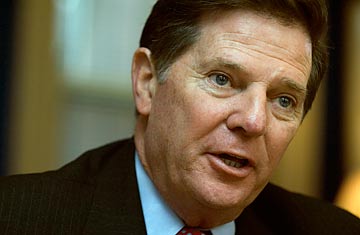
Former Texas Republican Congressman Tom DeLay during a 2007 interview
As the campaign season heats up, Democrats may soon have something to distract the public from the ethics controversies of Democratic U.S. Representatives Charles Rangel and Maxine Waters. On Aug. 24, former Republican majority leader Tom DeLay — who last appeared in the spotlight on TV's Dancing with the Stars — is expected to sashay into an Austin courtroom for a pre-trial hearing in his five-year battle over a money-laundering charge. The hearing brings the former Texas Congressman, once known as the "Hammer" for his take-no-prisoners approach to legislation, one step closer to a trial. It is also likely to remind voters of the ethical lapses that proved disastrous for the GOP back in 2006.
DeLay's legal tango with arch nemesis Austin district attorney Ronnie Earle has actually turned into a legal version of the classic Sydney Pollack flick They Shoot Horses, Don't They? — an exhausting, desperate dance marathon. DeLay's attorney, Dick DeGuerin, a legal star of the Texas defense bar, says it has been an ordeal for his client, with the experience being especially hard on DeLay's family. "But he is chipper and always upbeat," DeGuerin says, adding that his client's personality is completely the opposite of his public image as the arm-twisting Hammer, an image he says was concocted and embellished by his political enemies.
In 2005, an Austin grand jury handed down indictments against DeLay and two fundraising operatives, John Colyandro and Jim Ellis, who were his aides. The three men are charged with moving $190,000 in corporate campaign contributions from Texas businesses through the Republican National Committee to DeLay's Texas political-action committee, Texans for a Republican Majority (TRMPAC). The maneuver, prosecutors say, was an attempt to sidestep the state's ban on corporate funding of state races. TRMPAC proved valuable in helping Republicans win control of the Texas House of Representatives for the first time since Reconstruction and put them in the driver's seat during a mid-decade congressional redistricting process widely seen as a DeLay operation.
The stakes are high for DeLay and his fellow defendants — they face felony charges with at least one year in prison for money-laundering, more for alleged conspiracy — and attorneys for all three men are promising an aggressive and further protracted fight. But it has been a long, long contest — and any kind of conclusion is not in sight. DeLay has been eager to go to trial since Day One, DeGuerin says, but appeals by the former Congressman's fellow defendants, Ellis and Colyandro, plus counterappeals by the prosecution, have slowed the process. This spring, the state's top appellate criminal court cleared the way for a trial, but left open the possibility that the question that brought the case to their attention — whether the state's money-laundering law included the moving of checks by the defendants — could be pursued post-trial.
The extended battle has been a colorful one, at least on the sidelines. After his indictment in September 2005, DeLay announced his departure from Congress in April 2006. He then found himself fighting in court to take his name off the ballot in the crucial November elections and allow the Texas Republican Party to name his successor. But Democrats won that legal fight and went on to take DeLay's seat in the fall elections — only to lose it to the Republicans again two years later. In 2007, DeLay published his memoir No Retreat, No Surrender: One American's Fight and then waltzed into the public arena again in the fall of 2009 as a contestant on Dancing with the Stars. Flashing his familiar grin, he battled foot injuries that eventually forced his second public withdrawal from the national stage.
When he appears for the Aug. 24 hearing, however, DeLay will no longer be dancing against his legal nemesis. Prosecutor Earle, a Democrat, retired in 2009 and ran unsuccessfully this year in the Texas Democratic Primary for lieutenant governor. Taking his place, though, is his longtime assistant prosecutor, Rosemary Lehmberg, who says she is just as committed to pursuing the case against DeLay and his two aides, saying it is an important one that involves felony violations of Texas election law.
But the new hearing will provide more potential for drawing out the procedures. For one, DeLay will be on hand to watch as DeGuerin offers several motions, including one to sever his case from the other defendants. Colyandro's attorney, Joe Turner, has suggested he may seek intervention from the U.S. Supreme Court on the issue of corporate political donations at the heart of the Citizens United decision that felled the McCain-Feingold campaign-funding law — an appeal that could slow the process again. DeGuerin also plans to ask for a change of venue out of staunchly Democratic Austin to DeLay's old congressional district and current home southwest of Houston.
A trial is unlikely to come this year, DeGuerin says, and so he plans to press for dismissal based on the denial of his client's speedy trial rights. "Either dismiss the charges or go to trial," he says, adding that memories have faded, witnesses have moved and, unlike a murder case, "here, events are not as memorable, as exciting as, say, a fight in a bar." But while time may have fogged memories of events, it has not cooled political passions. Texas Republicans look likely to hold on to control of the statehouse this fall, giving them once again the dominant role in redistricting, even more politically significant now as Texas may gain four or more congressional seats. Given that, the sight of the Hammer in the dock later this month may be a small comfort for his political adversaries, but at least they can hope it might remind voters that alleged ethics violations are a bipartisan affair.
